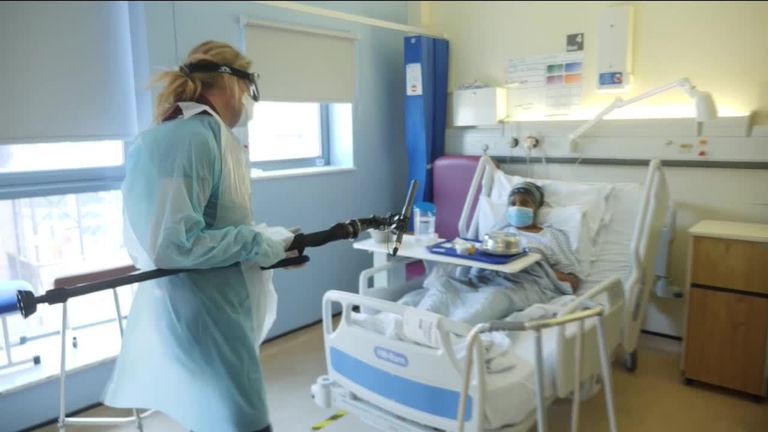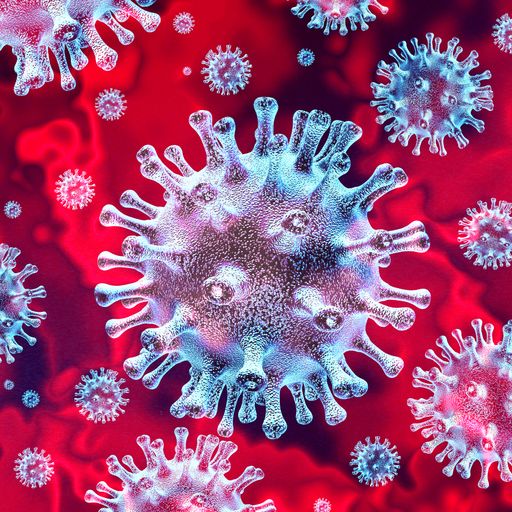Coronavirus: 'We're frightened' - Inside one of the UK's worst-hit hospitals
Sky's Alex Crawford reports from one of London's worst-hit hospitals, where patients cough and wheeze into oxygen bags.
Friday 10 April 2020 11:45, UK
It's one of the worst affected hospitals in London and is now working at nearly four times its normal critical care capacity because of COVID-19.聽
Wards at Croydon University Hospital in south London - like the one we have been invited to - were once used for looking after elderly orthopaedic patients. Now, they are filled with those suffering from COVID-19 - a disease we still know so little about.
Some of the stricken cough and wheeze into oxygen bags, and these are the less serious coronavirus patients.
These patients have not had to be admitted to intensive care, they are not receiving mechanical breathing support, and there are no teams of alien-looking medics dressed head to toe in hazmat suits wearing goggles.
This is an insight into an "ordinary" hospital ward operating in extraordinary times.
Those here still require an intense, methodical amount of care - care which will need to be 24 hours a day, seven days a week. And all of this care needs to be done while observing the strictest of hygiene protocols to ensure there is no cross-contamination and no spread.
The peak of the pandemic in the UK has yet to come, and no one can really know when that will be, or how this will end.
About half of Croydon University Hospital is already devoted to caring for coronavirus patients.
The hospital's chief executive, Matthew Kershaw, expects that percentage to rise over the coming weeks and months. However, he appears confident that the hospital will not reach a time when it is entirely taken over by the virus.
The people of Croydon will be hoping he is right.
This disease is not only highly contagious but deadly too. The hospital's managers are anxiously trying to balance a difficult message that this disease is dangerous and we all need to abide by the social distancing rules and staying at home - without creating unnecessary fear and panic.
Of those who have been admitted to this hospital, about a quarter haven't survived - and that has taken its toll on the staff who are battling against their own fears over the disease.
Chief nurse Elaine Clancy told us: "Patients are understandably frightened, staff are frightened as well… frightened that they can't automatically make patients better, they can't make this better... and they're frightened for themselves, their loved ones and their colleagues."
Every single person who is discharged is treated like a lottery winner.
Ward leader Marion Spence told us: "We cheer them on… if this was a football field, it would be filled with people cheering. We give them a good clap and cheer them on… and even on the phone, we tell the relatives 'It's good news… she's coming home!'"
:: Listen to the Daily podcast on , , ,
The hospital staff - like many in Britain - are stretched. They're coping with their own illnesses in their families; and the self-isolation and retreat from work that demands.
It has meant getting help from unusual quarters. On the ward where we are, there is a young woman who used to be serving gin and tonics in the first class cabin of a British Airways plane just a few weeks ago.
Tajah Duncan was furloughed but couldn't stay at home waiting for the situation to return to normal. "I decided to be one of the ones to come and help because I know this hospital particularly needed extra support," she said. "I wanted to be one of the ones who could help with that."
You only have to look at Pamela Mills, sitting attached to an oxygen mask next to her hospital bed, to realise it is a long way back once you contract the virus.
Pamela invites us into the ward to talk to her, and is clearly keen to tell us her experience.
She has already been in the hospital for a fortnight but tells us: "It sort of goes in sections... if I get up, go to the bathroom and come back, I have to fight for breath for a little while and then it all eases down.
"I seem to go through, sort of like a really horrible day when you think, you know, I just want to go to bed and stay there. And then you get a few days when you're a bit more light than the dark… you just can't tell."
I ask her what today has been like. "Boring," she replies - laughing.
Within seconds she is overwhelmed by a terrible hacking cough, apparently triggered by her laughing. The coughing goes on for several seconds and halts her talking altogether.
If there's been an upside to this, the hospital staff tell us, it's been the bonding, the pulling together, the camaraderie. Teams have laughed together but they have also cried together.
It has been a huge emotional strain on both staff, patients and their families but it has engendered a community spirit that few believe existed.













